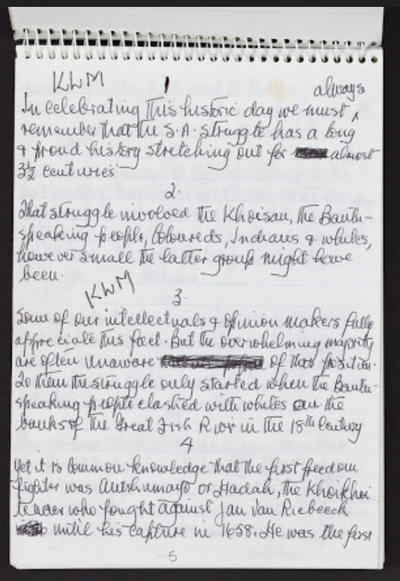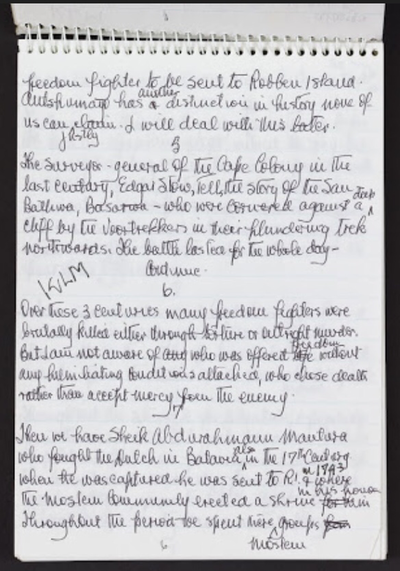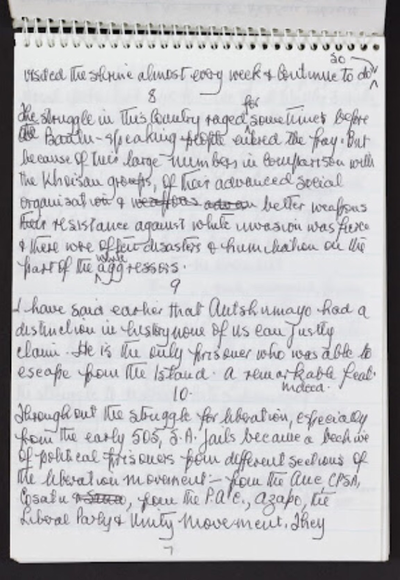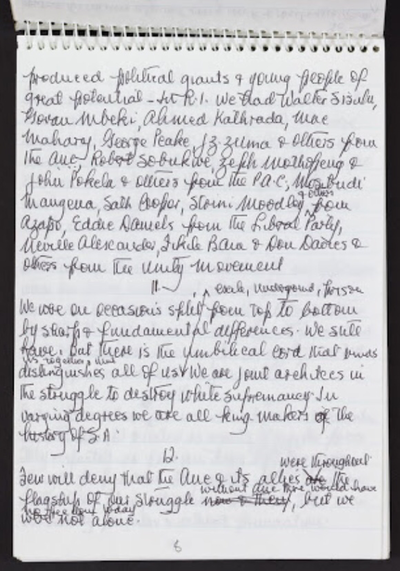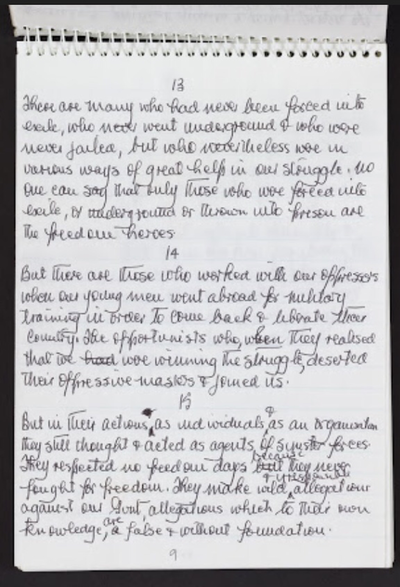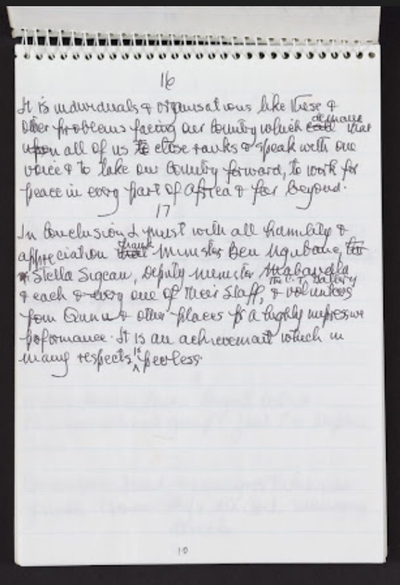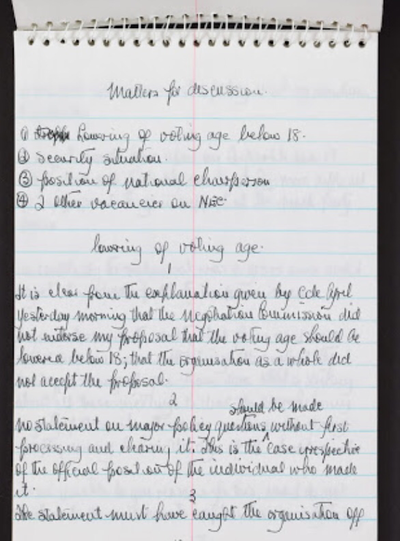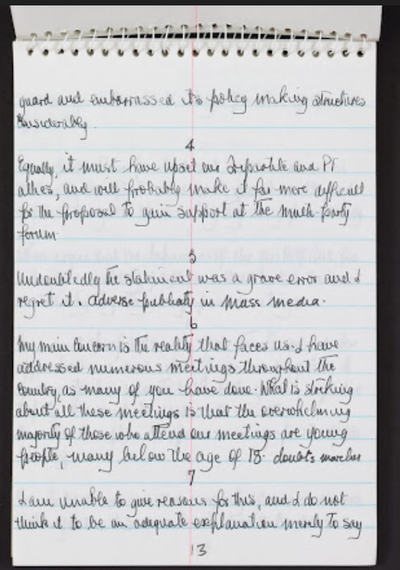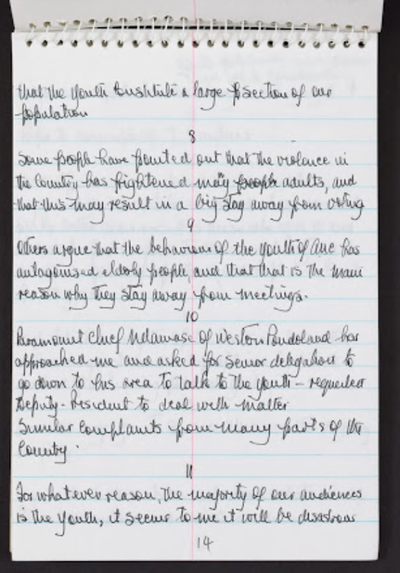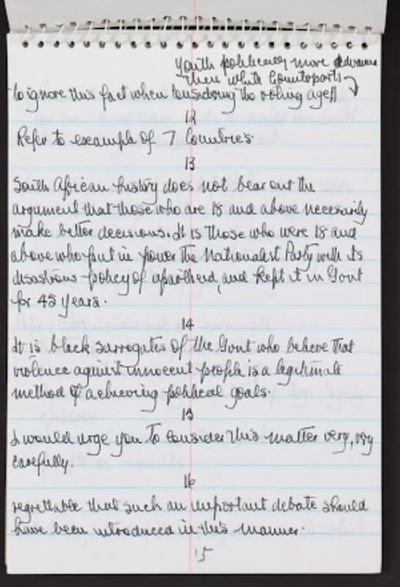Historical Documents
The following documents include letter written by Mandela to various people, and pages from Mandela's personal notebook detailing his days.
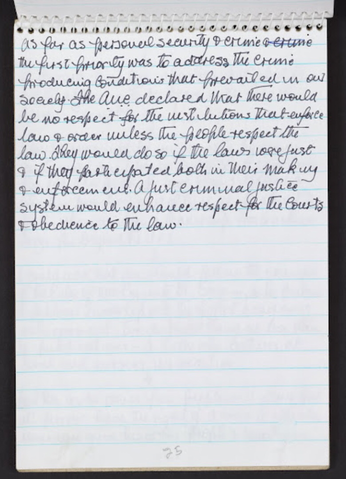
The note says the following: As far as personal security & crime crime the first priority was to address the crime producing conditions that prevailed in our society. The ANC declared that there would be no respect for the institutions that enforce law & order unless the people respect the law. They would do so if the laws were just & if they participated both in their making & enforcement. A just criminal justice system would enhance respect for the courts & obedience to the law. This means that Mandela thought that a good police system is one that the people respected and looked up to, not one where people become paranoid when seeing the police and there is no equality in the prosecutions, and where the police are filled with corruption.
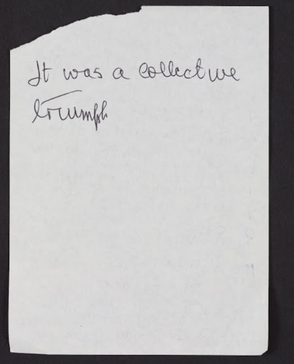
This note written by Mandela is only five simple words: it was a collective triumph, but they capture so much of the kind of person Mandela was and his approach to democracy and politics. The whole world idolized him and attributed to him South Africa's transformation from a racist system to a democratic order, but he continually reminded people that this was not the work of one person, but of many.
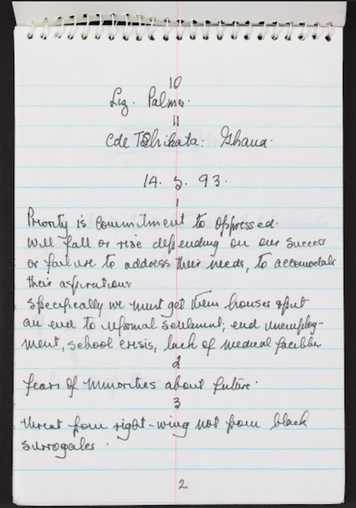
In this note that Nelson Mandela wrote in May 1993, he writes about what he sees as priorities for the country in the future after the end of white minority rule. He significantly focuses on the needs of the majority, the millions of black South African who had for centuries been denied a voice in the body politic of the country. He says this in the note: 1. Priority is commitment to oppressed. Will fall or rise depending on our success or failure to address their needs, to accommodate their aspirations. Specifically we must get them houses & put an end to informal settlements; end unemployment, school crisis, lack of medical facilities. 2. Fears of minorities about future. 3. Threat from right wing not from black surrogates.
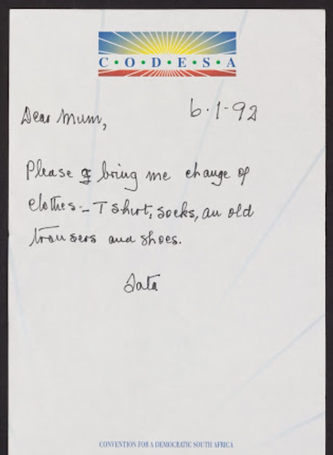
This letter that Mandela wrote to his wife Winnie was written because as soon as he was released from prison, he walked into political negotiations between his African National Congress (ANC), and the ruling National Party. He wrote the letter to his wife asking him to bring a change of clothes to him because he was working so hard with others trying to create a peaceful transition from white minority rule to a democratic order, that he didn't have any time to go home and change his clothes.
The gallery of documents above is a six page drafts for a speech that Mandela was preparing for. The speech was in honor of all of the people of all races and groups in South Africa who helped and supported the abolishing of apartheid. He was thanking them, and specifically thanks a small group of white people who joined the freedom struggle.
Since his handwriting is hard to read, this is what the papers say:
1. In celebrating this historic day we must always remember that the S.A. struggle has a long and proud history stretching out for almost 3½ centuries.
2. That struggle involved the Khoisan, the Bantu-speaking people, People who are Colored, Indians and whites, however small the latter group might have been.
3. Some of our intellectuals and opinion makers fully appreciate this fact. But the overwhelming majority are often unaware of this position. To them the struggle only started when the Bantu-speaking people clashed with whites on the banks of the Great Fish River in the 18th Century.
4. Yet it is common knowledge that the first freedom fighter was Autshumayo or Hadah, the Khoikhoi leader who fought against Jan Van Riebeek until his capture in 1658. He was the first freedom fighter to be sent to Robben Island. Autshumayo has another distinction in history none of us can justly claim. I will deal with this later.
5. The surveyor-general of the Cape Colony in the last century, Edgar Stow, tells the story of the San – Bathwa, Basatwa – who were cornered against a deep cliff by the Voortrekkers in their plundering trek northwards. The battle lasted for the whole day – Continue.
6. Over these 3 centuries many freedom fighters were brutally killed either through torture or outright murder. But I am not aware of any who was offered freedom without any humiliating conditions attached, who chose death rather than accept mercy from the enemy.
7. Then we have Sheik Abdurahman Mantura who fought the Dutch in Batavia also in the 17th Century. When he was captured he was sent to RI [Robben Island] in 1743 and where the Moslem community erected a shrine in his honor. Throughout the period we spent there Moslem groups visited the shrine almost every week and continue to do so.
8. The struggle in this country raged for sometime before the Bantu-speaking people entered the fray. But because of their large numbers in comparison with the Khoisan groups, of their advanced social organization and better weapons their resistance against white invasion was fierce and there were often disasters and humiliation on the part of white aggressors.
9. I have said earlier that Autshumayo had a distinction in history none of us can justly claim. He is the only prisoner who was able to escape from the Island. A remarkable feat indeed.
10. Throughout the struggle for liberation, especially from the early 50s, S.A. jails became a beehive of political prisoners from different sections of the liberation movement – from the ANC, CPSA, Cosatu, from the P.A.C., Azapo, the Liberal Party and Unity Movement. They produced political giants and young people of great potential – In R.I. we had Walter Sisulu, Govan Mbeki, Ahmed Kathrada, Mac Maharaj, George Peake, JZ Zuma and others from the ANC, Robert Sobukwe, Zeph Mothopeng and John Pokela and others from the P.A.C; Mosibudi Mangena, Sath [sic] Cooper, Strini Moodley and others from Azapo, Eddie Daniels from the Liberal Party, Neville Alexander, Fikile Bam and Don Davies and others from the Unity Movement.
11. We were on occasions split from top to bottom by sharp and fundamental differences. We still have. But there is the umbilical cord that binds us together, that distinguishes all of us, exile, underground, prisoner. We are joint architects in the struggle to destroy white supremacy. In varying degrees we are all king-makers of the history of S.A.
12. Few will deny that the ANC and its allies were throughout the flagship of our struggle without ANC there would have [been] no freedom today, but we were not alone. There are many who had never been forced into exile, who never went underground and who were never jailed, but who nevertheless were in various ways of great help in our struggle. No one can say that only those who were forced into exile, or underground or thrown into prison are the freedom heroes.
13. But there are those who worked with our oppressors when our young men went abroad for military training in order to come back and liberate their country. The opportunists who, when they realized that we were winning the struggle, deserted their oppressive masters and joined us.
14. But in their actions as individuals and as an organization they still thought and acted as agents of sinister forces. They respected no freedom days because they never fought for freedom. They make wild and irresponsible allegations against our Govt, allegations which to their own knowledge, are false and without foundation. It is individuals and organizations like these and other problems facing our country which demand that all of us close ranks and speak with one voice and to take our country forward, to work for peace in every part of Africa and far beyond.
15. In conclusion I must with all humility and appreciation thank Ministers Ben Ngubane, Stella Sigcau, Deputy Minister Mabandla and each and every one of their staff, the C.T. [Cape Town] Gallery and volunteers from Qunu and other places for a highly impressive performance. It is an achievement which in many respects is peerless
After this, it cuts off, and we assume it is because it was an unfinished draft.
Since his handwriting is hard to read, this is what the papers say:
1. In celebrating this historic day we must always remember that the S.A. struggle has a long and proud history stretching out for almost 3½ centuries.
2. That struggle involved the Khoisan, the Bantu-speaking people, People who are Colored, Indians and whites, however small the latter group might have been.
3. Some of our intellectuals and opinion makers fully appreciate this fact. But the overwhelming majority are often unaware of this position. To them the struggle only started when the Bantu-speaking people clashed with whites on the banks of the Great Fish River in the 18th Century.
4. Yet it is common knowledge that the first freedom fighter was Autshumayo or Hadah, the Khoikhoi leader who fought against Jan Van Riebeek until his capture in 1658. He was the first freedom fighter to be sent to Robben Island. Autshumayo has another distinction in history none of us can justly claim. I will deal with this later.
5. The surveyor-general of the Cape Colony in the last century, Edgar Stow, tells the story of the San – Bathwa, Basatwa – who were cornered against a deep cliff by the Voortrekkers in their plundering trek northwards. The battle lasted for the whole day – Continue.
6. Over these 3 centuries many freedom fighters were brutally killed either through torture or outright murder. But I am not aware of any who was offered freedom without any humiliating conditions attached, who chose death rather than accept mercy from the enemy.
7. Then we have Sheik Abdurahman Mantura who fought the Dutch in Batavia also in the 17th Century. When he was captured he was sent to RI [Robben Island] in 1743 and where the Moslem community erected a shrine in his honor. Throughout the period we spent there Moslem groups visited the shrine almost every week and continue to do so.
8. The struggle in this country raged for sometime before the Bantu-speaking people entered the fray. But because of their large numbers in comparison with the Khoisan groups, of their advanced social organization and better weapons their resistance against white invasion was fierce and there were often disasters and humiliation on the part of white aggressors.
9. I have said earlier that Autshumayo had a distinction in history none of us can justly claim. He is the only prisoner who was able to escape from the Island. A remarkable feat indeed.
10. Throughout the struggle for liberation, especially from the early 50s, S.A. jails became a beehive of political prisoners from different sections of the liberation movement – from the ANC, CPSA, Cosatu, from the P.A.C., Azapo, the Liberal Party and Unity Movement. They produced political giants and young people of great potential – In R.I. we had Walter Sisulu, Govan Mbeki, Ahmed Kathrada, Mac Maharaj, George Peake, JZ Zuma and others from the ANC, Robert Sobukwe, Zeph Mothopeng and John Pokela and others from the P.A.C; Mosibudi Mangena, Sath [sic] Cooper, Strini Moodley and others from Azapo, Eddie Daniels from the Liberal Party, Neville Alexander, Fikile Bam and Don Davies and others from the Unity Movement.
11. We were on occasions split from top to bottom by sharp and fundamental differences. We still have. But there is the umbilical cord that binds us together, that distinguishes all of us, exile, underground, prisoner. We are joint architects in the struggle to destroy white supremacy. In varying degrees we are all king-makers of the history of S.A.
12. Few will deny that the ANC and its allies were throughout the flagship of our struggle without ANC there would have [been] no freedom today, but we were not alone. There are many who had never been forced into exile, who never went underground and who were never jailed, but who nevertheless were in various ways of great help in our struggle. No one can say that only those who were forced into exile, or underground or thrown into prison are the freedom heroes.
13. But there are those who worked with our oppressors when our young men went abroad for military training in order to come back and liberate their country. The opportunists who, when they realized that we were winning the struggle, deserted their oppressive masters and joined us.
14. But in their actions as individuals and as an organization they still thought and acted as agents of sinister forces. They respected no freedom days because they never fought for freedom. They make wild and irresponsible allegations against our Govt, allegations which to their own knowledge, are false and without foundation. It is individuals and organizations like these and other problems facing our country which demand that all of us close ranks and speak with one voice and to take our country forward, to work for peace in every part of Africa and far beyond.
15. In conclusion I must with all humility and appreciation thank Ministers Ben Ngubane, Stella Sigcau, Deputy Minister Mabandla and each and every one of their staff, the C.T. [Cape Town] Gallery and volunteers from Qunu and other places for a highly impressive performance. It is an achievement which in many respects is peerless
After this, it cuts off, and we assume it is because it was an unfinished draft.
The gallery above is a couple of pages from Mandela's notes from a previous meeting in preparation for another meeting. This shows that Mandela was a very organized person and wanted every topic covered. The notes mostly consists of how Mandela wanted to bring up bringing the voting age down to fourteen years of age, amongst other matter.
The transcript of the notes:
Matters for discussion
1)Lowering of voting age below 18.
2) Security situation.
3) Position of national chairperson
4) 2 other vacancies on NEC.
Lowering of voting age
1. It is clear from the explanation given by Cde Cyril yesterday morning that the negotiation commission did not endorse my proposal that the voting age should be lowered below 18; that the organization as a whole did not accept the proposal.
2. No statement on major policy questions should be made without first processing and clearing it. This is the case irrespective of the official position of the individual who made it.
3. The statement must have caught the organization off guard and embarrassed its policy making structures considerably.
4. Equally, it must have upset out Tripartite and PF allies, and will probably make it far more difficult for the proposal to gain support at the multi-party forum.
5. Undoubtedly the statement was a grave error and I regret it. Adverse publicity in mass media.
6. My main concern is the reality that faces us. I have addressed numerous meetings throughout the country, as many of you have done. What is striking about all these meetings is that the overwhelming majority of those who attend our meetings are young people, many below the age of 18. doubts marches
7. I am unable to give reasons for this, and I do not think it to be an adequate explanation merely to say
that the youth constitute a large section of our population
8. Some people have pointed out that the violence in the country has frightened many adults, and that this may result in a big stay away from voting.
9. Others argue that the behavior of the youth of ANC has antagonized elderly people, and that that is the main reason why they stay away from meetings.
10. Paramount Chief Ndamase of Western Pondoland has approached me and asked for senior delegates to go down to his area to talk to the youth – requested Deputy-President to deal with matter.
Similar complaints from many parts of the country.
11. For whatever reason, the majority of our audiences is the youth, it seems to me it will be disastrous to ignore this fact when considering the voting age. Youth politically more advanced than white counterparts
12. Refer to example of 7 countries
13. South African history does not bear out the argument that those who are 18 and above necessarily make better decisions. It is those who were 18 and above who put in power the Nationalist Party with its disastrous policy of apartheid, and kept it in Govt for 45 years.
14. It is black surrogates of the Govt who believe that violence against innocent people is a legitimate method of achieving political goals.
15. I would urge you to consider this matter very, very carefully.
16. Regrettable that such an important debate should have been introduced in this manner.
The transcript of the notes:
Matters for discussion
1)Lowering of voting age below 18.
2) Security situation.
3) Position of national chairperson
4) 2 other vacancies on NEC.
Lowering of voting age
1. It is clear from the explanation given by Cde Cyril yesterday morning that the negotiation commission did not endorse my proposal that the voting age should be lowered below 18; that the organization as a whole did not accept the proposal.
2. No statement on major policy questions should be made without first processing and clearing it. This is the case irrespective of the official position of the individual who made it.
3. The statement must have caught the organization off guard and embarrassed its policy making structures considerably.
4. Equally, it must have upset out Tripartite and PF allies, and will probably make it far more difficult for the proposal to gain support at the multi-party forum.
5. Undoubtedly the statement was a grave error and I regret it. Adverse publicity in mass media.
6. My main concern is the reality that faces us. I have addressed numerous meetings throughout the country, as many of you have done. What is striking about all these meetings is that the overwhelming majority of those who attend our meetings are young people, many below the age of 18. doubts marches
7. I am unable to give reasons for this, and I do not think it to be an adequate explanation merely to say
that the youth constitute a large section of our population
8. Some people have pointed out that the violence in the country has frightened many adults, and that this may result in a big stay away from voting.
9. Others argue that the behavior of the youth of ANC has antagonized elderly people, and that that is the main reason why they stay away from meetings.
10. Paramount Chief Ndamase of Western Pondoland has approached me and asked for senior delegates to go down to his area to talk to the youth – requested Deputy-President to deal with matter.
Similar complaints from many parts of the country.
11. For whatever reason, the majority of our audiences is the youth, it seems to me it will be disastrous to ignore this fact when considering the voting age. Youth politically more advanced than white counterparts
12. Refer to example of 7 countries
13. South African history does not bear out the argument that those who are 18 and above necessarily make better decisions. It is those who were 18 and above who put in power the Nationalist Party with its disastrous policy of apartheid, and kept it in Govt for 45 years.
14. It is black surrogates of the Govt who believe that violence against innocent people is a legitimate method of achieving political goals.
15. I would urge you to consider this matter very, very carefully.
16. Regrettable that such an important debate should have been introduced in this manner.
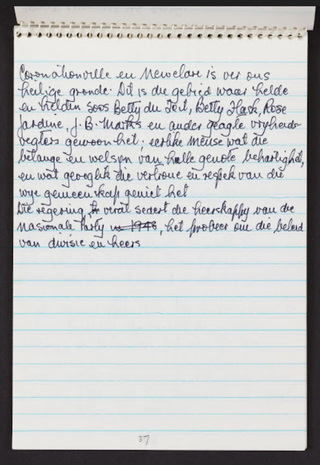
This note is written in South Africa's language, Afrikaans, by Mandela. It is a note written to the residents of the Johannesburg suburbs of Coronationville and Newclare about how his government would not make them live in suburbs specifically for colored people, as they were living when the note was written. Mandela learned Afrikaans in prison in 1964 because he always felt strongly that in order to reach people’s hearts, one should speak their language. The letter translates to this:
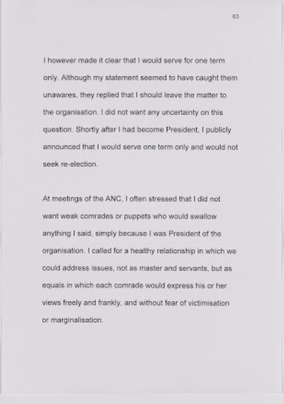
This page is an excerpt from the draft of what would have been the sequel to Nelson Mandela's Long Walk to Freedom. It tells how Mandela would only serve one term. He believed that he was only the president because the people expected him to be after all he had done, but he had not wanted to be president. He believed that someone younger should take on the responsibility.
